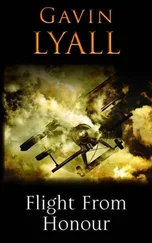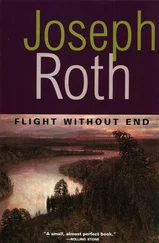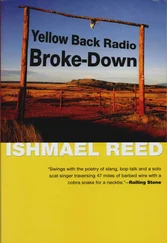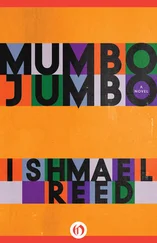Robin, having filled the bucket, begins to return to the dining room. She catches his arm, “Robin, when you going to take me out, like you said you were going to? On one of those trips you make for Mr. Swille.”
“Shut up, girl. You want to get me into trouble? You young wimmen all alike. No discretion.” He leaves a giggling Bangalang behind.
When Robin returned to the dining room it was too late. The fire was sleeping off its dinner.
PART III. THE BURNING OF RICHMOND
What are we all — white Negroes, or serfs or what? What is the little man, Jeff Davis? Where did he get it? Is this man one of the Caesars? Or is he one of the Medici? Or perhaps the last of the Bothic …? Or is he veritably “the last of the Bourbons”? Can it be so? Or is he indeed that little backwoods man from Mississippi … the very worst executive officer known in the modern world since the time of his prototype, James II of England.
The Charleston Mercury, February 7, 1865
WHAT THE AMERICAN ARTHURIANS couldn’t win on the battlefield will now be fought out on the poetry field. Lincoln, the Saxon chief, is slain. Lincoln, London, two towns in Britain — Lincoln, London, England, Lincoln London England — the savage sounds of rock worshipers. “Anglo-Saxon was abandoned to the use of rustics and hinds, who knew no other,” Sir Walter Scott said. Sir Scott.
Old man Ruffin, who fired the first shot against the Union at Fort Sumter, shot himself when he heard that Lee had surrendered.
Jefferson Davis is captured, disguised in his wife’s hoops, shawl and rainproof coat. Davis’ defenders say it’s a lie. Historians still debate this.
Oscar Wilde, “The Great Decadent,” would say, “His fall after such an able and gallant pleading in his own cause must necessarily arouse pity.” Davis later invited “The Apostle of Aesthetics” to his Mississippi homestead, where Wilde “charmed” the ladies. Maybe it was Wilde’s knee breeches and the sunflower pinned to the lapel of his coat that appealed to them. Raised by mammies, the South is dandyish, foppish, pimpish; its writers are Scott, Poe, Wilde, Tennyson; its assassin left behind a trunk in which was found: “clothes in fine silk velvets; silks, ermine and crimson; and also hats, caps, plumes, boots, shoes, etc.”
Davis later said that he desired to carry on guerrilla warfare in the hills of Virginia. Davis missed the point. Davis, who was accused by The Charleston Mercury of treating Southerners like “white Negroes,” misread his people. It wasn’t the idea of winning that appealed to them. It was the idea of being ravished. Decadent and Victorian writing both use the romantic theme of fair youth slumbering. Fair youth daydreaming. Fair youth struck down. In the New Orleans Mardi Gras, that great Confederate pageant, the cult of Endymion has a whole evening. Saturday.
Davis claims he tried to wrestle his captors to the ground from their horses. He is a proud patrician with a “chiseled” nose and tells the Union soldier to kindly take his “buckrah” hands off of him. The rude Yankee soldiers refer to him as “Jeff,” and when he is jailed they draw cartoons of him hanging from a tree on the wall of his cell.
BUFFALO, NEW YORK. THE reading was held by the Anti-Slavery Society of Western New York at the Eagle Tavern, located at Main and Court streets. Above the entrance was an eagle holding in its talons a banner which read, “Our Rights, Our Liberty.” It was a red building, three stories high, with a balustrade fronting the roof.
There was a spacious entrance hall and a reception parlor. On one side was a bar. Inside the bar was a wood-and-charcoal fireplace. On the walls there were photos and autographs of famous customers: Dan Webster, General Lafayette.
Before the reading they had dined on roasted and fricasseed fowl, boiled potatoes and vegetables.
For cocktails, Quaw Quaw, Quickskill and their hosts had partaken of a large decanter of brandy. Their hosts were very friendly and had arranged for them to be taken to Canada by a Friend. The reading, however, was far from successful.
Things kept going wrong with the microphone. The lights went out a couple of times. When Quickskill mentioned, in passing, that Millard Fillmore, a well-known Buffalo man and first chancellor of the University of Buffalo, had signed the Fugitive Slave Law, one heckler threw a tomato; the heckler was hustled out, but Quickskill’s lecture suit got smeared, and some got in his hair. He had had it done in the style of Frederick Douglass and Abe Lincoln and John Wilkes Booth, one side of the forehead shaved back V-like. Some of the people in the front row began to snore, and the black help from the kitchen stood on the side, making comments, talking loud and staring at him evilly.
He wasn’t a performer, and some of the people in the audience wanted more fire. He remembered the man at Lincoln University who said, “Quickskill, you all right. You make some good points. But you ought to put a little more fire into it.” And when he said “fire,” he hit his left open palm with his right fist. A little more fire. They wanted to get warm.
Sometimes he felt like a cheap Sears, Roebuck furnace. A little fire, but not enough to heat the whole house. Some of the other slaves were downright rude. They came in late, and when they didn’t like what he was saying, got up, making comments, and walked out. Other slaves, however, sat at attention. They’d begun some kind of Raven cult. He didn’t want to have a cult. A Raven is always on the move. A cult would tie him down.
Not only were the slaves enslaved by others, but they often, in subtle ways, enslaved each other. As soon as he and Quaw Quaw had entered the tavern, two of the female slave help had begun to let out their ignorant slave cackle, giving them signifying looks.
Slaves judged other slaves like the auctioneer and his clients judged them. Was there no end to slavery? Was a slave condemned to serve another Master as soon as he got rid of one? Were overseers to be replaced by new overseers? Was this some game, some fickle punishment for sins committed in former lives? Slavery on top of slavery? Would he ever be free to do what he pleased as long as he didn’t interfere with another man’s rights? Slaves held each other in bondage; a hostile stare from one slave criticizing the behavior of another slave could be just as painful as a spiked collar — a gesture as fettering as a cage.
Some of the people had remained behind to chat with Quickskill about his work, including the two Friends who were his hosts. They were eating Freedom Hamburgers. A little Union flag hung from the toothpick that went through the buns and the meat. Quaw Quaw was still upset by the poem. Once in a while he would squeeze her hand. She’d lay her head on his shoulder. He wondered if they’d ever be as deeply in love with each other as before. Would it be a “cerebral” relationship, with them occasionally fucking like crazy animals? They said they wouldn’t become involved the way they had before. They’d just enjoy each other, learn from each other. She was a twentieth-century woman. Way ahead of the Beecherites. Finally a man appeared at the door. The two Friends nodded.
Quickskill and Quaw Quaw picked up their baggage and followed the man who was standing in the doorway. He said, “The carriage that will take you to Black Rock has arrived. Good luck, my brother, my sister.”
They got in. This was it. There was a Ryder moon over the water when they arrived at the ferry. They could see the yacht not far from the shore. The yacht that would take them to freedom.
A man rowed them out in a canoe. “I thought we’d stopped these runs since the war was over. What’s going on?”
Читать дальше












